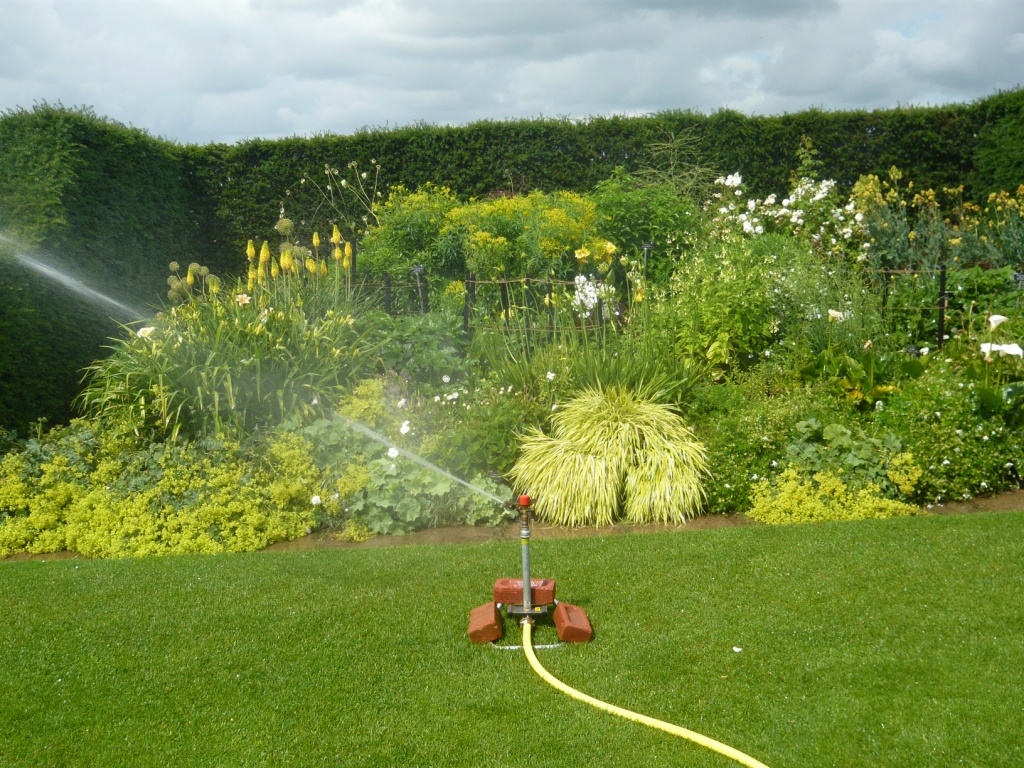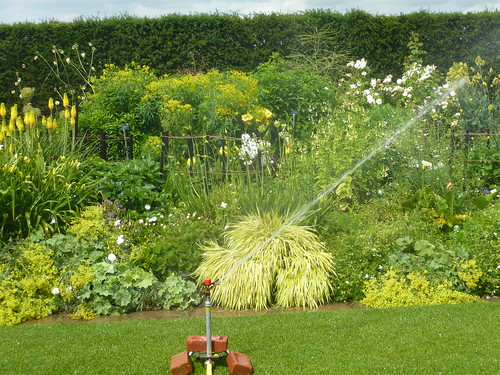
Ecology of Water in the Garden
Why is Water Important in the Garden
- About 90% of active plants cells are water.
- Water is the means of a plant obtaining dissolved nutrients to feed the plant
- Water moves chemicals and hormones from the roots of plants to the growing parts of the plant
- Water maintains a plants health
- The presence of water can be necessary to germinate seeds or stimulate natural growth.
Water for Plants and Trees
- Precipitation in the form of rain, drizzle, dew, and fog all have a place in providing water
- Hail, snow, sleet and hoar frost also provide limited amounts of water.
- Ground water from springs underground streams and the natural water table can contribute to the soils water content.
- Gardener introduced water augments the natural systems.
- Irrigation is a form of transporting water through channels or pipes.
- Foliar feeding can provide limited amounts of water via a plants leaves.
- Watering devices, sprinklers, hosepipes and watering cans are the gardeners best friends in dry or drought conditions.
Problems Caused by Lack of Water
- Deprived of water to transport food a plant may starve
- Biological malfunction caused by lack of water can cause irreparable damage to a plant cells leading to loss of turgidity and death.
- Lack of water may cause structural instability in the plant.
- Water shortage can make a plant more susceptible to heat.
Rain Zones in the UK
- High ground in the west of Scotland, Wales and Cumbria has the most rainfall. .
- Cyclonic or convection rain can occur over low ground such as East Anglia but this is low in frequency and volume so flat areas have low or very low average rainfall.
- 30″-45″ are annual average levels of rain but there are many surprises within averages. London with 25″ pa is drier than Rome or New York. Colchester can be drier than Beirut or Jerusalem
- Thunderstorm rain can be damaging by flattening crops or causing excess splashing back off the soil. This is not zone specific.
- In addition to volumes of rainfall the frequency or consecutive number of days without rain can be crucial. Apart form the south east most zones seldom exceed 30 days without rain and in Scotland and Ireland it rains even more regularly.
Water Retentiveness
- Water retentiveness is crucial for a healthy trouble free garden.
- Improved soil structure by the addition of compost and manures increases the water in the soil.
- The addition of a top layer or mulch holds water in the soil reducing evaporation
- Alginates like seaweed increase water retention and improve the crumb structure of the soil.
- Retentiveness is damaged by compacted soil that water is unable to penetrate.
Gardeners Water Tips
- Understand your plants and select them based on their need for water. How much and when are valid questions
- Too much water can be as bad as too little so ensure you have the right drainage in your soil not a sticky mess.
- When augmenting natural supply of water do a thorough job of watering then leave for a few days. Little and often can bring roots to the surface and not penetrate to the deeper drinking roots
- Do not plant water hungry plants in heavy rain shadows caused by walls hedges or other plants.
- Be aware of the prevailing wind that brings the most rain from the west.
What is in my Water
- Oxygen and hydrogen are the elements that have combined to form water. They are not available separately except for an amount of oxygen that may have been dissolved in the H2O. Pond fish and algae need this dissolved oxygen.
- Hard water contains dissolved mineral salts (this is what makes up the fur or limescale on a kettle). Hard water may be drawn straight from the tap in many districts of the UK where calcium and magnesium are present. This water is often detrimental to young plants.
- Soft water has little or no dissolved mineral salts and like rain water is better for seedlings and young plants. Distilled water and ionised treated water is rendered soft by the process.
- Sea water and brackish water contains dissolved salt (sodium chloride)that will kill most plants. It is no use in gardens.
- Stagnant water and old water from butts will contain algae or microscopic life. I have found that this often results in moss or growth on the top of seed pots before the seeds germinate. Clean water is best for seeds and greenhouses.
Top ten green garden habits
See our report on ‘Organic pond habitats for green gardeners’.

One thought on “Ecology of Water in the Garden”
Comments are closed.